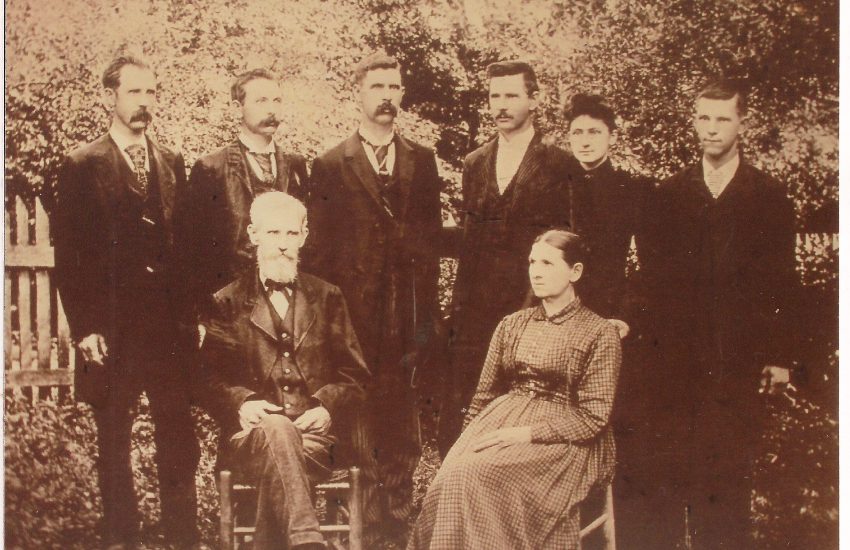Dale Hotel – by Ann Stover
I was contacted recently by Ann Stover, a former resident of Livingston who taught at Livingston Academy. She now lives in Goodyear, Arizona. Ann was interested to know if I had ever done a story about the Dale Hotel that was once a very prominent establishment here in Livingston. Since I had not done a story on that hotel, Ann was kind enough to share her memories. She is a great-great granddaughter of Civil War Veteran Alfred Lafayette Dale who operated several hotels, at least two being located in Livingston and one in Celina. Here are Ann’s memories of the Dale Hotel previously located on the corner of East Broad and Goodpasture Streets in Livingston.
“The Dale Hotel was located across from the Brown Hotel on what was in those days 201 East Broad Street. It was run by three sisters: Lura Esther Dale born 1877, Elizabeth (Betsy) Renee Dale born 1878, and Mona May Dale born 1881. They were the daughters of Civil War veteran Alfred Lafayette (A.L.) Dale born 1840 and Sarah Butler Dale born 1847. After the Civil War and after several years of moving from place to place during Reconstruction, A. L. Dale returned to Overton County to farm, log timber and eventually begin a hotel business. In 1884, he rented for $300 per year what was then called the Overton Hotel (not sure where this was located in Livingston). Also in 1884 his wife, Sarah Butler Dale, died and he subsequently married her sister, Lousetta Butler, to help raise his six children, at which time he moved back to Butlers Landing to farm and cut timber. At one point he operated the Riverside Hotel in Celina located near the Cumberland River. In 1910, A.L. Dale moved back to Livingston and rented the Commercial Hotel from Mrs. L. B. Estes for $300 per year and remained in the hotel business. With Lousetta Butler, A.L. Dale had five more children.
“A.L. Dale lived to be 91 years of age and his last birthday was held in 1931 on the front porch of the Dale Hotel with many of his children, grandchildren, and great grandchildren in attendance. His three daughters Lura, Betsy and Mona ran the Dale Hotel. As you entered the hotel, there was a sitting parlor with guest bedrooms on each side, and in the back of the parlor was a bathroom. To the right towards the back was a large dining room with kitchen off the side toward back porch. The dining table was very large and on court days, it was the gathering place for lawyers, guests and other business people of Livingston. My fondest memory was having dinner at that crowded table laden with every kind of vegetable that was grown in their own garden, meat and desserts all homemade and cooked on a wood stove. I assume because of their father’s service in the Confederacy, the parlor always had a large picture of Robert E. Lee on the wall. Like the Brown Hotel, distinguished visitors also stayed at the Dale Hotel, especially Grand Ole Opry stars. My mother remembers Little Jimmy Dickens staying at the Dale and did a show in Livingston. Hudson Cullom, a well known black handyman in Livingston, spent much of his time working at the Dale Hotel. Lura died in 1955, but Betsy and Mona continued to operate the hotel until their death in 1964 and 1965 respectively. After their death the hotel, fell into disrepair. At one time it was converted into apartments but the building became a hazard and later torn down.
The following is from a story I did several years ago about Alfred Lafayette Dale: According to information compiled by Lucien Dale, a family genealogist in the Dale family, Alfred Lafayette Dale’s grandfather, William Dale, Sr., was a pioneer flatboat builder and operator who lost his life on the hazardous Obey River. William Dale, Sr. was a close personal friend of Moses Fiske of Hilham and was married to Rachel Irons. They reared a family of ten children. One of his sons, William Dale, Jr., father of Alfred Lafayette Dale, migrated down the river and reared his family at the site of the present Dale Hollow Dam. In an article written by Alfred Lafayette Dale, he described pioneer life as follows:
“My father built a large cedar log house that was one of the best in the country. This house was built by Benjamin Smith and son, Martin, father of B.F. Smith of Livingston, Confederate soldier and newspaper agent for the Nashville Tennessean, a democrat paper. The house was built of the best cedar, well hewed with a broad axe. The chimney was made of limestone rock. The mason was Bill Fluty. Myself and my twin brother, Andy, bothered Mr. Fluty so much that he threatened to whip us. The chimney had a 6 foot fireplace. I have seen my father roll in backlogs that were too heavy to be carried. These were very useful to make a good lasting fire. After the house was completed, the kitchen was built next. There was a large fireplace in the kitchen which was used to cook on as there were no such things as cooking stoves in those days. The only lights used then were grease lights and tallow candles. All the cooking utensils used then were a large cast iron kettle, baking oven, a skillet, frying pan and a coffee pot. On Sunday mornings for breakfast, we always had plenty of milk and butter, honey, tree molasses sugar, and plenty of meat for there was always lots of hogs killed each year. A fat beef was killed often too. Chickens and eggs were plentiful as there was no market for them. The woods were full of squirrels and the river full of fish.
“The river land would make 50 to 75 bushels of corn per acre. The corn was always worked and plowed four times and was laid by about the fifteenth of July. Wheat sowing time was about the first of September. Wheat was sowed by hand, about a bushel to the acre. At harvest time, the wheat was cut with reap hooks. The wheat was frailed by hand labor, and a good hand could frail out about ten bushels per day. There were no wagons then and an ox cart drawn by a yoke of oxen was the only way farmers had of hauling in their crops and other things.
“The ox teams were used by flat boat builders. I have seen as many as six teams of oxen hitched to one boat gunnel. This boat building was mostly a gathering of farmers. Everybody was anxious and willing to help his neighbors. A big dinner and plenty of whiskey and brandy to drink was enjoyed by all those present. The women would have a big quilting party at the same time. A big supper and dance always followed. All had a happy, good time, but times have changed since 1847.
“The schools were limited to three months only. There were no colleges or high schools then. I received enough education somehow to be able to transact my own business by the time I was nineteen years old.
“I joined the army of September 8, 1861, and with 113 men, was sent to Camp Zollicoffer. We next went to camp at Mill Springs, Kentucky, retreated to Decatur, Alabama, and from there to Corinth, Mississippi. I came back home on May 11, 1862 and stayed to August 15, 1862. From there, I went to Knoxville and stayed a while and then came back to Murfreesboro in November, 1862. Then my brother, John, and I were transferred to General Bedford Forrest’s Company on June 15, 1864.
“In the Butler’s Landing neighborhood, there were many good looking ladies, and on the seventeenth day of January, 1865, I married Miss Sarah Butler, the beautiful seventeen year old daughter of John Price Butler, a large farmer of that neighborhood. Most of Bennett’s Company was present at the wedding. A big supper was set for the bride and groom and all those present, after which was nice entertainment but no dancing. The supper was a great affair for all the neighbors, friends and everyone. After the supper was over, we all went to a dance at my brother’s house and the dance lasted till eleven o’clock. The next morning, we departed for William Dale’s home on Horse Creek. Captain Bennett and wife, myself and wife decided to move to Georgia to live. We drove through the country in wagons, leaving the sixth day of August and arriving in Jasper
County, Georgia about the last of August, feeling happy and jolly. We made a cotton crop in 1866 and the following December, decided to move back to Tennessee.”
On the front page of the December 10, 1931 Cookeville Herald newspaper, the headlines read: “Oldest Overton Vet Who Ran Hotel Here Dies at Livingston.” Here is the rest of that story: “Overton County’s oldest living Civil War Veteran, Captain A.L. Dale, 91, died this week following a long illness. He served under several noted commanders including Generals Felix Zollicoffer; Albert Sidney Johnson; Nathan Bedford Forrest; and John Hunt Morgan. Dale fought at Shiloh, Chickamauga and closer to home, at the Battle of Indian Graves on the Celina-Livingston road. Dale surrendered at Carthage in 1865, one of the last Confederates whose surrender was accepted, according to local history. After the war, Dale went into the lumber business and then ran a series of hotels in Livingston, Cookeville, Celina and Gordonsville.”

